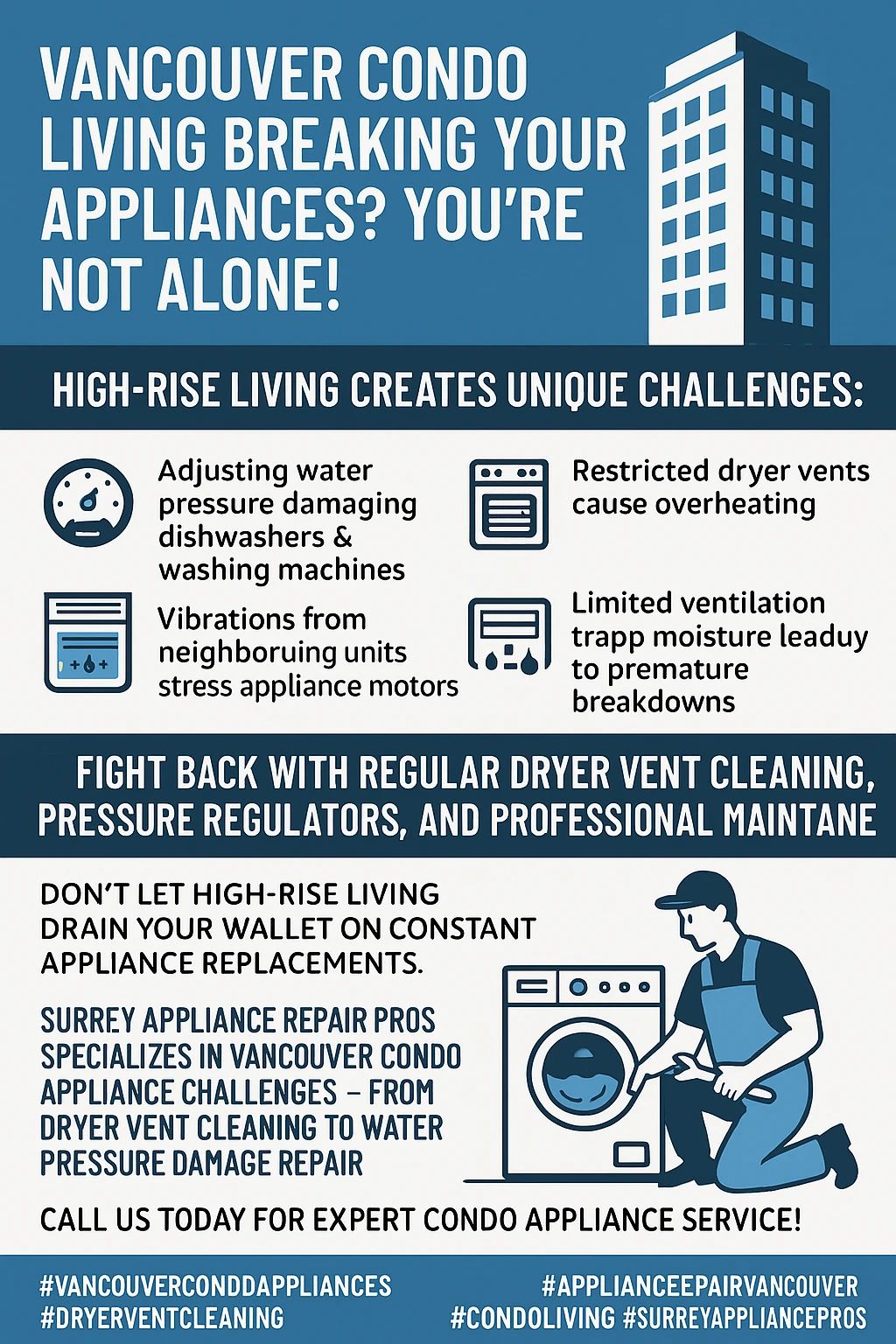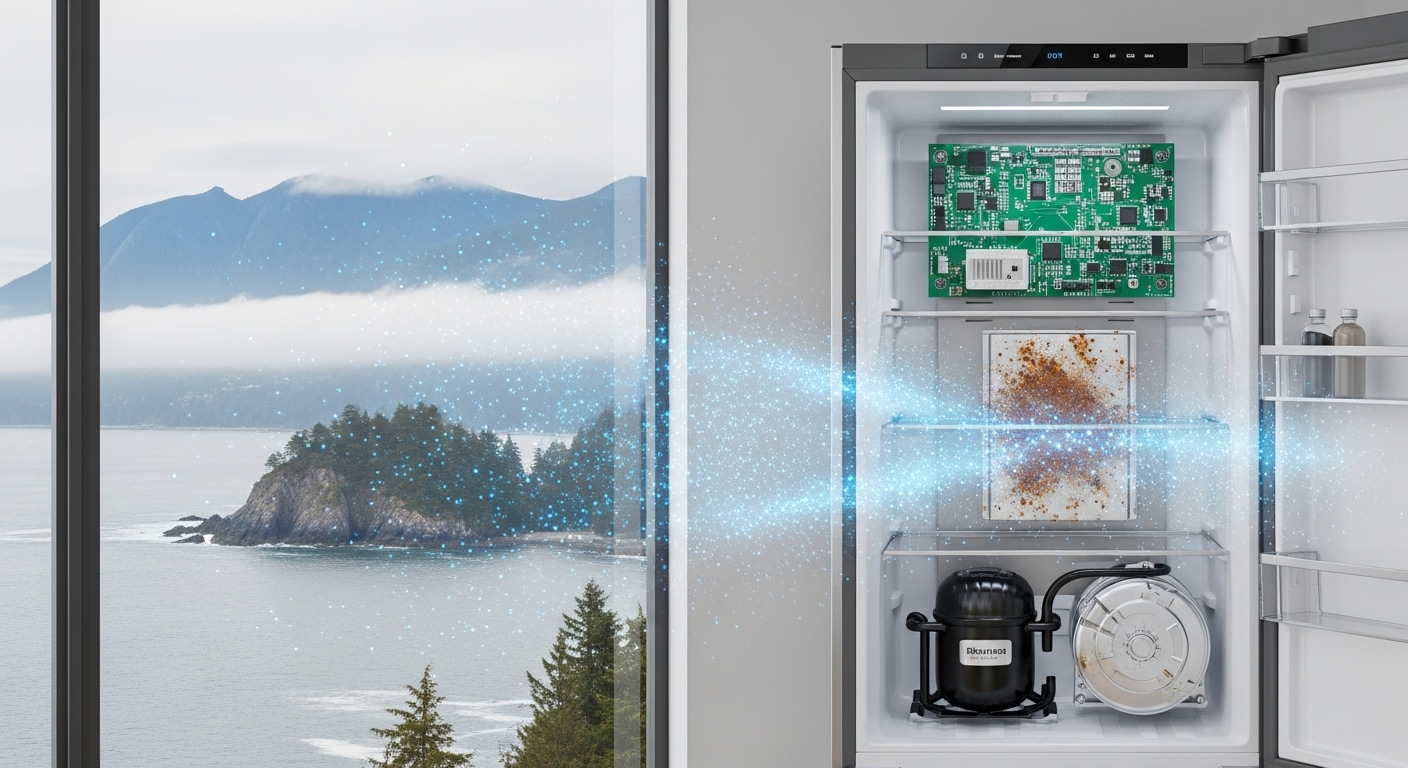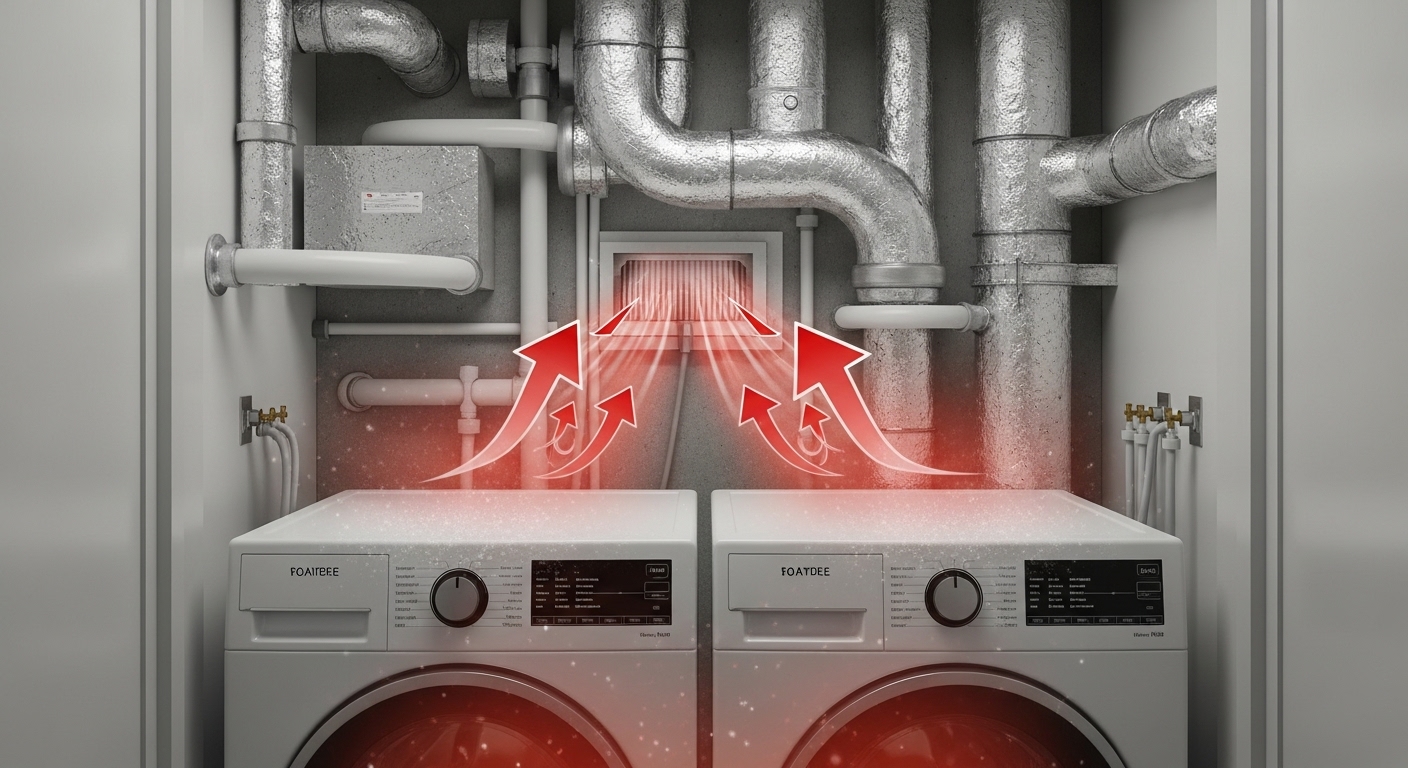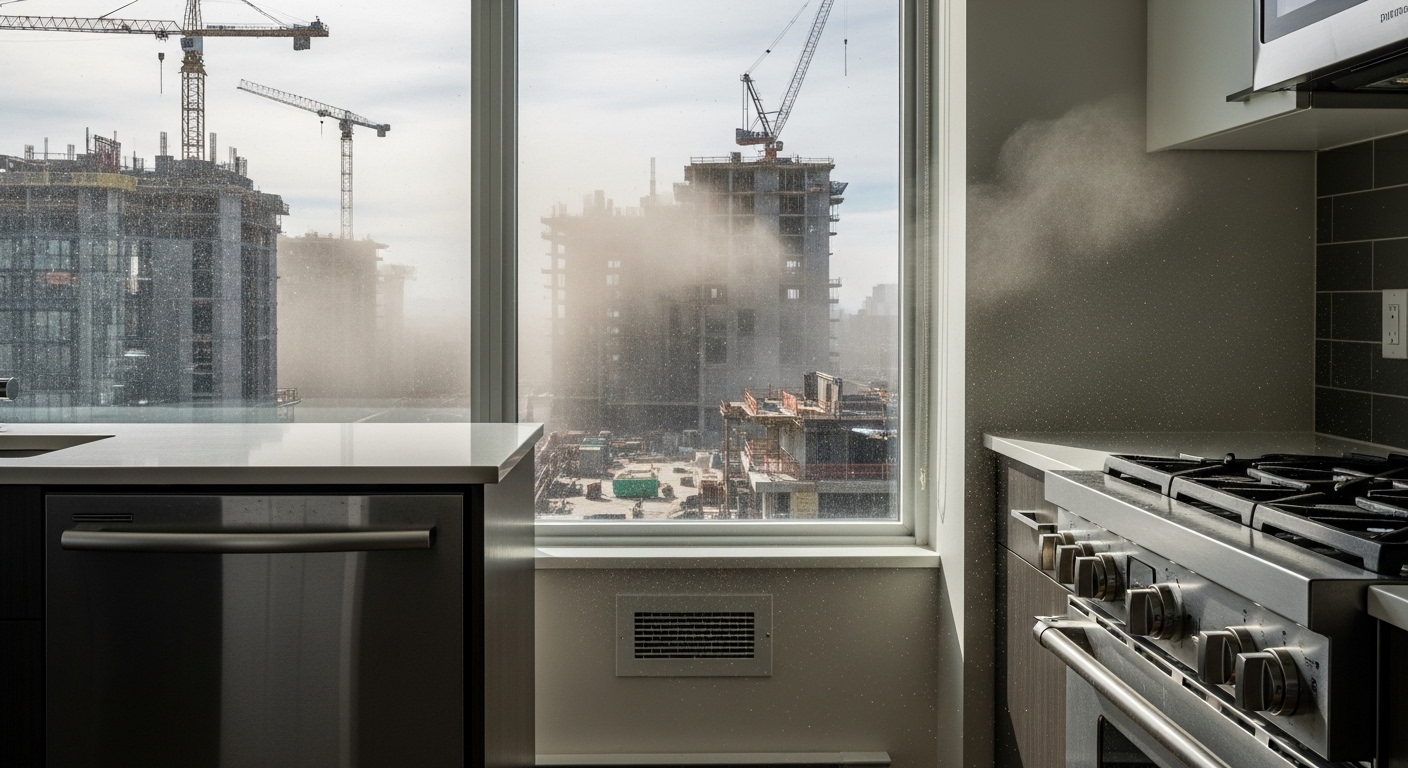Vancouver Condo Appliance Challenges: Why High-Rise Living Breaks Your Appliances Faster (And How to Fight Back)
Tired of constantly repairing or replacing appliances in your Vancouver condo? Discover why coastal high-rise living can reduce your appliance lifespan by up to 30% and learn the proven strategies that can add years to your investment.Vancouver’s stunning waterfront condos offer breathtaking views and urban convenience, but they come with a hidden cost that most owners discover too late. Your beautiful high-rise home is quietly working against your appliances every single day, creating a perfect storm of conditions that can slash their expected lifespan by 20-30%. From salt air corrosion to inadequate ventilation systems, the very features that make Vancouver condos desirable are simultaneously creating an appliance graveyard on every floor.The financial impact hits hard when you’re already managing strata fees, property taxes, and mortgage payments. Suddenly facing premature appliance failures worth thousands of dollars can strain any budget. The good news? Understanding these unique challenges and implementing targeted maintenance strategies can help you fight back against the environmental factors that threaten your appliance investment. Once you know what you’re up against, you can take proactive steps to protect your home and your wallet.
Key Outtakes:
- Vancouver’s coastal humidity and salt air accelerate appliance corrosion and reduce lifespan by 20-30% compared to interior locations
- High-rise buildings deliver only 8% of intended air circulation to individual units, forcing appliances to work overtime
- Clogged dryer vents cause 33% of residential dryer fires, making regular cleaning critical in multi-unit buildings
- Strata regulations can complicate appliance repairs and replacements, requiring advance approval for many modifications
- Professional maintenance strategies tailored to Vancouver’s environment can extend appliance life by 3-5 years despite challenging conditions

Vancouver’s Coastal Climate: The Hidden Appliance Killer
Living by the water comes with postcard-perfect views, but Vancouver’s marine environment creates invisible challenges that manufacturers simply don’t account for in their warranties. The combination of persistent humidity levels ranging from 60-80% and salt-laden air infiltrating through ventilation systems creates a corrosive cocktail that attacks your appliances from the inside out.  Salt air doesn’t politely remain outside your condo windows. It infiltrates through ventilation systems, settling on electronic circuits and metal components where it accelerates corrosion at rates far exceeding normal wear patterns. This marine environment reduces appliance lifespan by an average of 20-30% compared to interior locations, meaning that refrigerator expected to last 12 years might give up after just 8-9 years of coastal living. The constant moisture also creates condensation in places where water was never meant to accumulate, leading to rust, electrical shorts, and component failure.Temperature fluctuations from Vancouver’s marine climate cause another layer of damage through constant expansion and contraction of metal components. These thermal cycles stress connections, degrade seals, and create micro-cracks that allow moisture penetration. Your dishwasher’s electronic control board, your dryer’s heating element, and your refrigerator’s compressor all face accelerated aging in this environment. The humidity levels consistently hover above optimal ranges for appliance operation, turning what should be minor maintenance issues into major repair needs.Electronic components are particularly vulnerable to Vancouver’s coastal conditions. Circuit boards, sensors, and control modules that would operate reliably for years in drier climates begin failing prematurely when exposed to the constant moisture and salt contamination. This explains why many condo owners find themselves dealing with mysterious electronic glitches, inconsistent performance, and premature control panel failures that seem to have no clear cause.
Salt air doesn’t politely remain outside your condo windows. It infiltrates through ventilation systems, settling on electronic circuits and metal components where it accelerates corrosion at rates far exceeding normal wear patterns. This marine environment reduces appliance lifespan by an average of 20-30% compared to interior locations, meaning that refrigerator expected to last 12 years might give up after just 8-9 years of coastal living. The constant moisture also creates condensation in places where water was never meant to accumulate, leading to rust, electrical shorts, and component failure.Temperature fluctuations from Vancouver’s marine climate cause another layer of damage through constant expansion and contraction of metal components. These thermal cycles stress connections, degrade seals, and create micro-cracks that allow moisture penetration. Your dishwasher’s electronic control board, your dryer’s heating element, and your refrigerator’s compressor all face accelerated aging in this environment. The humidity levels consistently hover above optimal ranges for appliance operation, turning what should be minor maintenance issues into major repair needs.Electronic components are particularly vulnerable to Vancouver’s coastal conditions. Circuit boards, sensors, and control modules that would operate reliably for years in drier climates begin failing prematurely when exposed to the constant moisture and salt contamination. This explains why many condo owners find themselves dealing with mysterious electronic glitches, inconsistent performance, and premature control panel failures that seem to have no clear cause.
High-Rise Infrastructure Limitations: When Buildings Work Against Your Appliances
Your beautiful high-rise building’s infrastructure creates a cascade of challenges that force your appliances to work much harder than they were designed to handle. The ventilation inefficiency alone represents one of the most significant threats to appliance longevity, with research showing that only 8% of intended air circulation actually reaches individual dwelling units after passing through building systems.  This ventilation crisis begins in the building’s common areas, where only 40% of ventilation air makes it into corridors. By the time air reaches your individual unit, you’re receiving just a fraction of what engineers intended. The result is a constantly humid, stagnant environment where dehumidifying appliances like air conditioners must run overtime, cooking odors and moisture linger for hours, and washers and dryers struggle with moisture that simply won’t evacuate. This compromised air quality directly translates to appliance strain and failure rates that are 40-50% higher than properly ventilated homes.Water pressure variations between floors create another set of problems that affect multiple appliances simultaneously. Upper floors experience insufficient pressure that makes dishwashers struggle to fill properly, ice makers work inefficiently, and washing machines extend their cycles. Lower floors may face excessive pressure that damages delicate appliance mechanisms, causes premature wear on valves and connections, and leads to unexpected leaks. These pressure inconsistencies aren’t just inconvenient – they’re actively shortening the lifespan of any appliance that relies on water.Electrical load management has become increasingly critical as Vancouver’s older condo buildings reach capacity limits. Some communities have experienced blackouts from the combined demand of heat pumps, electric vehicle charging, and standard appliances, forcing building managers to implement strict restrictions on appliance upgrades. When electrical systems operate near capacity, voltage fluctuations become common, creating conditions that damage sensitive electronic components in modern appliances. Your refrigerator’s variable-speed compressor, your dishwasher’s electronic controls, and your dryer’s moisture sensors all suffer when electrical delivery becomes inconsistent.The shared building systems create interdependent performance issues where problems in one area cascade to affect your appliances. When the building’s HVAC system struggles, individual units experience temperature and humidity swings that force appliances to compensate. When plumbing systems develop issues, water quality and pressure problems appear throughout the building. These systemic challenges mean that even well-maintained appliances face environmental stresses that single-family homes simply don’t encounter.
This ventilation crisis begins in the building’s common areas, where only 40% of ventilation air makes it into corridors. By the time air reaches your individual unit, you’re receiving just a fraction of what engineers intended. The result is a constantly humid, stagnant environment where dehumidifying appliances like air conditioners must run overtime, cooking odors and moisture linger for hours, and washers and dryers struggle with moisture that simply won’t evacuate. This compromised air quality directly translates to appliance strain and failure rates that are 40-50% higher than properly ventilated homes.Water pressure variations between floors create another set of problems that affect multiple appliances simultaneously. Upper floors experience insufficient pressure that makes dishwashers struggle to fill properly, ice makers work inefficiently, and washing machines extend their cycles. Lower floors may face excessive pressure that damages delicate appliance mechanisms, causes premature wear on valves and connections, and leads to unexpected leaks. These pressure inconsistencies aren’t just inconvenient – they’re actively shortening the lifespan of any appliance that relies on water.Electrical load management has become increasingly critical as Vancouver’s older condo buildings reach capacity limits. Some communities have experienced blackouts from the combined demand of heat pumps, electric vehicle charging, and standard appliances, forcing building managers to implement strict restrictions on appliance upgrades. When electrical systems operate near capacity, voltage fluctuations become common, creating conditions that damage sensitive electronic components in modern appliances. Your refrigerator’s variable-speed compressor, your dishwasher’s electronic controls, and your dryer’s moisture sensors all suffer when electrical delivery becomes inconsistent.The shared building systems create interdependent performance issues where problems in one area cascade to affect your appliances. When the building’s HVAC system struggles, individual units experience temperature and humidity swings that force appliances to compensate. When plumbing systems develop issues, water quality and pressure problems appear throughout the building. These systemic challenges mean that even well-maintained appliances face environmental stresses that single-family homes simply don’t encounter.
Construction Boom Impacts: How Development Dust Destroys Your Investment
Vancouver’s unprecedented construction density has turned many neighborhoods into perpetual construction zones, exposing condos to environmental hazards that can cause thousands of dollars in appliance damage. Living within 200 feet of active construction increases appliance failure rates by up to 30%, yet most residents don’t realize the danger until expensive repairs become necessary. The combination of construction dust particles with Vancouver’s high humidity levels creates sticky, corrosive compounds that penetrate appliance interiors and cause damage that’s difficult to repair.  Construction dust isn’t just an annoyance – it’s an appliance killer. When drywall dust, concrete particles, and metal shavings mix with Vancouver’s 60-80% humidity levels, they form compounds that behave more like cement than dry particles. These sticky contaminants infiltrate through ventilation systems, around windows, and through any available opening to settle on internal components. Once inside your appliances, these particles interfere with moving parts, clog filters, coat electronic components, and create insulation layers that cause overheating.The delayed effect of construction damage makes it particularly insidious. Problems often don’t manifest until weeks or months after construction activity ends, making it difficult for homeowners to connect current appliance failures to past construction exposure. A refrigerator compressor that fails six months after nearby construction may seem like random bad luck, but the failure often traces back to dust contamination that gradually degraded cooling efficiency. Dishwashers develop mysterious clogs, dryers overheat from blocked vents, and air conditioners struggle with dirty coils – all symptoms of construction dust infiltration.Multiple simultaneous projects create “construction corridors” where exposure becomes continuous rather than temporary. Vancouver’s density means that finishing one project doesn’t provide relief because another begins nearby. This continuous exposure overwhelms normal air filtration systems and creates accumulation patterns that standard HVAC filters can’t handle. Households face potential damage ranging from $3,000-8,000 across all their appliances if proper prevention measures aren’t implemented during construction periods.Vibration damage represents another construction-related threat that affects appliances with delicate components. Heavy machinery
Construction dust isn’t just an annoyance – it’s an appliance killer. When drywall dust, concrete particles, and metal shavings mix with Vancouver’s 60-80% humidity levels, they form compounds that behave more like cement than dry particles. These sticky contaminants infiltrate through ventilation systems, around windows, and through any available opening to settle on internal components. Once inside your appliances, these particles interfere with moving parts, clog filters, coat electronic components, and create insulation layers that cause overheating.The delayed effect of construction damage makes it particularly insidious. Problems often don’t manifest until weeks or months after construction activity ends, making it difficult for homeowners to connect current appliance failures to past construction exposure. A refrigerator compressor that fails six months after nearby construction may seem like random bad luck, but the failure often traces back to dust contamination that gradually degraded cooling efficiency. Dishwashers develop mysterious clogs, dryers overheat from blocked vents, and air conditioners struggle with dirty coils – all symptoms of construction dust infiltration.Multiple simultaneous projects create “construction corridors” where exposure becomes continuous rather than temporary. Vancouver’s density means that finishing one project doesn’t provide relief because another begins nearby. This continuous exposure overwhelms normal air filtration systems and creates accumulation patterns that standard HVAC filters can’t handle. Households face potential damage ranging from $3,000-8,000 across all their appliances if proper prevention measures aren’t implemented during construction periods.Vibration damage represents another construction-related threat that affects appliances with delicate components. Heavy machinery

